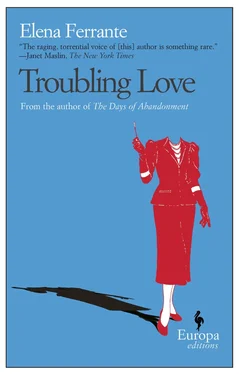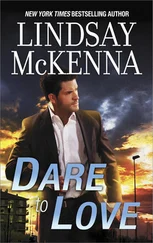“You don’t remember and you don’t know,” Uncle Filippo repeated, bitterly, because those times had vanished which had seemed to him good, and they had gone without bearing the promised fruit.
Then I asked him what had happened to Caserta after the break with my father. Many possible furious answers passed through his eyes. Then he decided to abandon the most violent, and asserted proudly that they had given Caserta what he deserved.
“You told your father everything. Your father called me and we went to murder him. If he had tried to react, we really would have killed him.”
Everything. Me. I didn’t like that suggestion and didn’t want to know what “you” he was talking about. I cancelled out every sound that stood in for my name as if it were not possible to allude to me in any way. He looked at me questioningly and, seeing me impassive, shook his head again in disapproval.
“You remember nothing,” he repeated, discouraged. And he went on to tell me about Caserta. Afterward, he was frightened and had understood. He had sold a half-failing bar-pasticceria that was his father’s and left the neighborhood with his wife and son. After a while a rumor had surfaced that he was a receiver of stolen medicines. Then it was said that he had invested the money from that trafficking in a print shop. Strange, because he wasn’t a printer. The hypothesis of Uncle Filippo was that he printed covers for pirated records. Anyway, at some point a fire had destroyed the print shop and Caserta had been in the hospital for a while because of burns he had suffered on his legs. From that time on, Filippo didn’t know anything about him. Some thought that he had gotten rich thanks to the money from the insurance, and so had gone to live in another city. Others said that after he was burned he had gone from doctor to doctor, and had never been cured: not because of the injury to his legs but because he had a screw loose. He had always been a strange man: it was said that as he grew old he became even stranger. That was it. Uncle Filippo didn’t know anything else about Caserta.
I asked him what his name was: I had looked in the phone book but there were too many Casertas.
“Don’t you dare look for him,” he said, growling again.
“I’m not looking for Caserta,” I lied. “I want to see Antonio, his son. We used to play together as children.”
“It’s not true. You want to see Caserta.”
“I’ll ask my father,” it occurred to me to say.
He looked at me in amazement, as if I were Amalia.
“You do it on purpose,” he muttered. And said in a low voice: “Nicola. His name was Nicola. But it’s pointless to look in the phone book: Caserta is a nickname. His actual last name I have here in my head but I don’t remember it.”
He seemed really to concentrate, to please me, but then he gave up, depressed: “Forget it, go back to Rome. If you really intend to see your father, at least don’t tell him about this shirt. Even today for a thing like that he would kill your mother.”
“He can’t do anything to her anymore,” I reminded him. But, as if he hadn’t heard, he asked:
“Do you want more coffee?”
I gave up on changing my clothes, and stayed in my dusty, wrinkled dark dress. I could barely find the time to change my tampon. Uncle Filippo, with his attentions and his angry outbursts, didn’t leave me alone for a minute. When I said that I had to go to the Vossi sisters’ shop to buy some underwear, he was bewildered, and remained silent for a few seconds. Then he offered to go with me to the bus.
The day was airless, and getting darker, and the bus turned out to be crowded. Uncle Filippo appraised the crowd and decided to get on, too, to protect me — he said — from purse snatchers and hoodlums. By some lucky circumstance a seat became free: I told him to sit down but he refused vigorously. I sat down myself and an exhausting journey began, through a city without colors, choked by traffic. There was a strong odor of ammonia in the bus, and hanging in the air a fine dust that at some point had come in through the open windows. It tickled your nose. My uncle managed to start an argument first with a man who had not moved aside quickly enough when, to get to the seat that was free, I had asked to get by, and then with a youth who was smoking even though it wasn’t allowed. Both treated him with a menacing scorn that took no account of his seventy years or his stump of an arm. I heard him curse and threaten, while he was pushed by the crowd far from me, toward the center of the bus.
I began to sweat. I was squeezed between two old women who stared straight ahead with an unnatural rigidity. One held her purse tight under her arm; the other pressed hers against her stomach, one hand on the clasp, the thumb in a ring attached to the pull of the zipper. The passengers who were standing leaned over us, breathing on us. Women suffocated between male bodies, panting because of that accidental closeness, irritating even if apparently guiltless. In the crush men used the women to play silent games with themselves. One stared ironically at a dark-haired girl to see if she would lower her gaze. One, with his eyes, caught a bit of lace between two buttons of a blouse, or harpooned a strap. Others passed the time looking out the window into cars for a glimpse of an uncovered leg, the play of muscles as a foot pushed brake or clutch, a hand absentmindedly scratching the inside of a thigh. A small thin man, crushed by those behind him, tried to make contact with my knees and nearly breathed in my hair.
I turned toward the nearest window, in search of air. When as a child I had made that same trip, by tram, with my mother, the vehicle climbed the hill with a sort of painful braying sound, like a donkey, among old gray buildings, until a strip of the sea appeared on which I imagined the tram would set sail. The panes of glass vibrated in their wooden frames. The floor also vibrated, sending up through the body a pleasant tremor that I let extend to my teeth, relaxing my jaws just slightly to feel how the top teeth jiggled against the bottom.
It was a journey I liked, going up in the tram, and returning in the funicular: the same slow, unfrenzied mechanisms, and just the two of us, my mother and me. Above, attached to the handrail by leather straps, swung massive handles. If you grabbed onto one, the weight of your body made the writing and colored drawings in the metal block above the handles jump, so that with every jerk the letters and images changed. The handles advertised shoe polish, shoes, various goods of local shops. If the tram wasn’t crowded, Amalia left some of her brown paper packages on the seat and held me up so I could play with the handles.
But if the tram was crowded, every pleasure was precluded. Then I was possessed by a mania to protect my mother from any contact with men, as I had seen my father do in the same situation. I placed myself like a shield behind her, crucified myself to her legs, my forehead against her buttocks, arms outstretched, one hand tight on the iron support of the seat on the right, the other on that of the left.
It was wasted effort, Amalia’s body couldn’t be contained. Her hips spread across the aisle toward the hips of the men on either side of her; her legs, her stomach swelled toward the knee or shoulder of whoever was sitting in front of her. Or maybe it was the opposite. Maybe it was the men who pasted themselves to her, like flies to the sticky yellowish paper that hung in butcher shops or, loaded with dead insects, dangled over the counters of the salumieri . It was hard to keep the men away with knees or elbows. They caressed my head lightly and said to my mother: “This pretty little girl’s getting crushed.” Someone even wanted to pick me up, but I refused. My mother laughed and said: “Come on, come here.” I resisted, anxiously. I felt that if I yielded they would take her away and I would be left alone with my angry father.
Читать дальше












